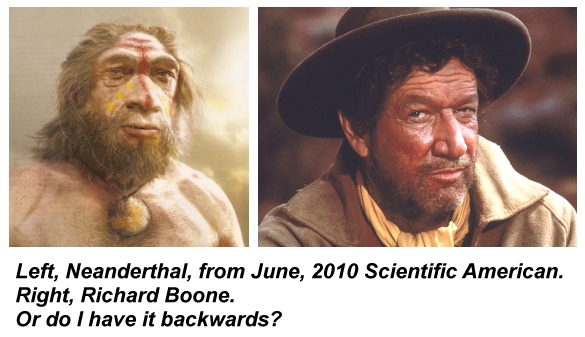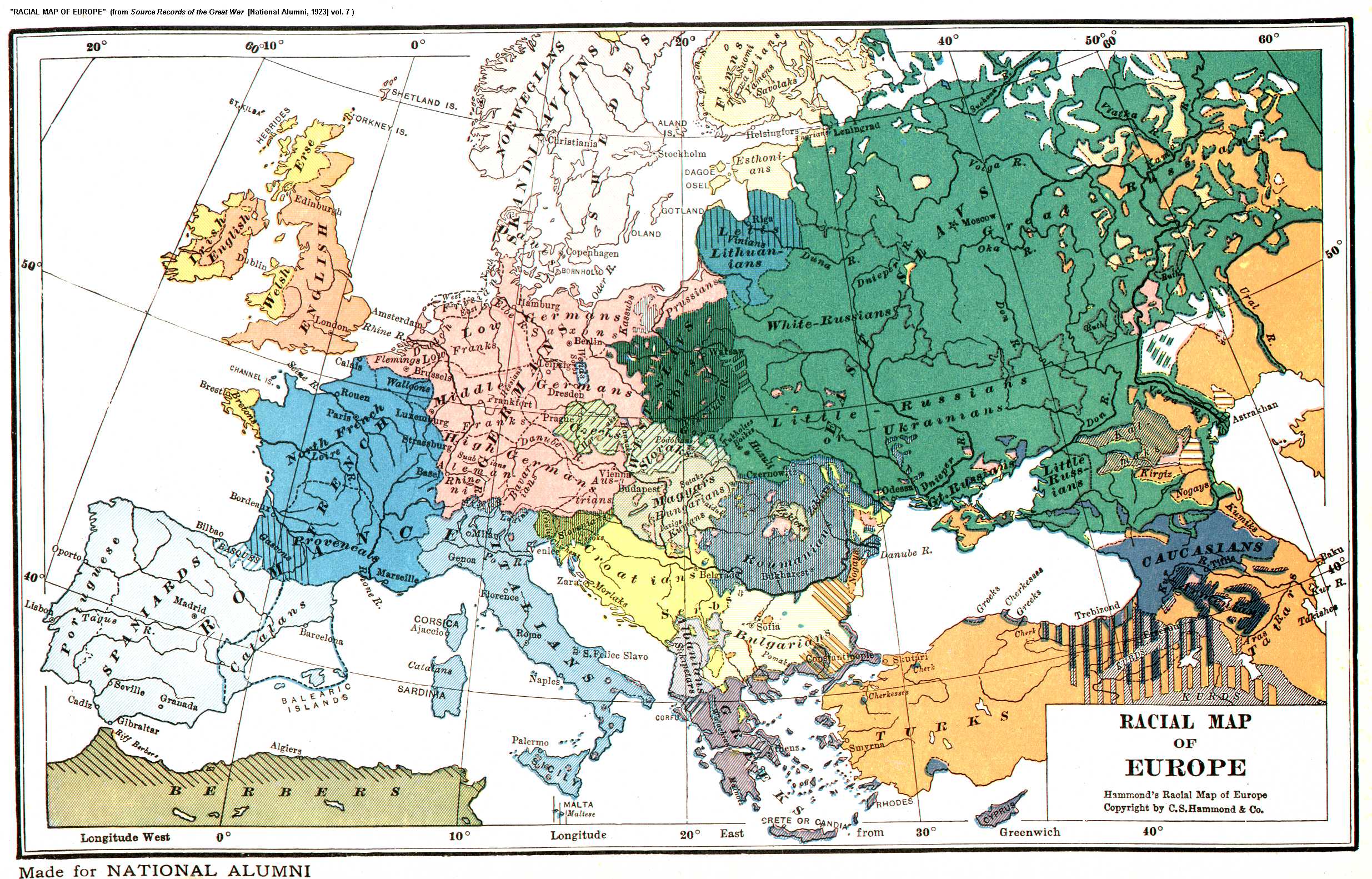When the creators of this map used the term "race" they meant "speech or culture group". "Ethnic Group" would be the modern term. In modern usage, "race" tends to connote a biological classification, though the term is seldom defined precisely, if at all, by those who use it. Recent research has shown that genetic differences between European ethnic groups are fairly trivial. See L. Luca Cavalli-Sforza et al., The History and Geography of Human Genes [Princeton: The Princeton University Press, 1994].
2018 Update ---
Ten years ago I researched references to this page and discovered that it was referenced by various sites that would commonly be described as "white supremacist". While the common label is accurate in some cases, many of these sites are just interested in European ethnology and anthropology. Their bible is The Races of Europe by noted anthropologist Carleton S. Coon (1904-1981). This is an interesting work for its description of the slight physical differences between various European populations in the early 20th century (but without expressing an opinion on the superiority of any). Its major thesis is that Homo Sapiens and Homo Neanderthalis interbred during the middle to late pleistocene in Europe, North Africa, and northern Asia, forming the basic stock from which Europeans descended. Once scorned, Coon's hypothesis is now confirmed, and additional evidence of archaic human admixture with modern humans continues to accumulate.
 Coon's book contains many photographs of
European types. Having stared at them for hours, the only type I
can reliably distinguish from the others without regard to pigmentation
is the "Upper Paleolithic", which resembles Bill Murray, and most
of the large lumpy-faced Irishmen I've known.
Coon's book contains many photographs of
European types. Having stared at them for hours, the only type I
can reliably distinguish from the others without regard to pigmentation
is the "Upper Paleolithic", which resembles Bill Murray, and most
of the large lumpy-faced Irishmen I've known.
Now, for a really good guide to the character of European (and Asian) peoples, you need to look at the 1842 edition of Olney's Geography by the celebrated Jesse Olney of Hartford. So here we go:
EUROPE
Norway -- The Norwegians are honest, brave, and industrious, and generally well instructed in the common branches of education.
Sweden -- The Swedes are polite, brave, and hospitable, and are distinguished for their general education and morality.
Lapland -- The Laplanders are under no regular government, and are a miserable, ignorant and superstitious race.
Russia -- The Russians are hardy, vigorous and patient of labor, but extremely rude, ignorant and barbarous. The lower classes are slaves to the nobles.
Poland -- The nobles are brave, hardy and active, but illiterate, haughty and extremely fond of dress. The peasants are ignorant, indolent, improvident, addicted to intoxication, and of course poor.
Prussia -- The higher classes are generally well informed, polite, and extremely fond of dress. The lower classes are ignorant, degraded, and superstitious. As a nation, they are distinguished for bravery and fondness for war.
Austria -- The nobles of Austria are ignorant, haughty and oppressive; the lower classes are active, moral and industrious.
Switzerland -- The Swiss are intelligent, brave, hardy, and industrious, and strongly attached to their native soil.
Germany -- The Germans are grave, industrious and persevering, and are distinguished for their proficiency in the arts and sciences.
Denmark -- The Danes are moral, intelligent, industrious and hospitable.
Holland -- The Dutch are honest, patient and persevering, and remarkable for their industry, frugality and neatness.
Belgium -- The Belgians are an industrious, neat and ingenious people, but generally superstitious, and noted for their fondness of religious ceremonies.
France -- The French are polite, gay, active and industrious, and celebrated for their proficiency in the arts and sciences.
England -- The English are intelligent, brave, industrious and enterprising, but possess great national pride.
Wales -- The Welsh are descendants of the ancient Britons. They are a passionate, but brave and hospitable people.
Scotland -- The Scots are temperate, industrious, hardy and enterprising, and are distinguished for their general education and morality.
Ireland -- The Irish in general are quick of apprehension, active, brave and hospitable; but passionate, ignorant, vain and superstitious.
Spain -- The Spaniards are temperate, grave, polite, and faithful to their word, but ignorant, proud, superstitious, and revengeful.
Italy -- The Italians are affable and polite, and excel in music, painting and sculpture; but they are effeminate, superstitious, slavish and revengeful.
Turkish Empire -- The Turks are honest, grave and hospitable to strangers; but haughty, bigoted, insolent and revengeful.
Greece -- The modern Greeks are a brave, active, ingenious and courteous people, but possess little information.
Arabia -- The Arabs are an ignorant, savage and barbarous people. Those on the coast are pirates; those in the interior are robbers. During the middle ages they were called Saracens, and were distinguished for learning and science, but at present they are so illiterate, that but few can be found who are able either to read or write.
Persia -- The Persians are polite, gay, polished and hospitable, but indolent, vain, avaricious and treacherous.
Afghanistan -- The Afghans are a brave, fierce and warlike people, and are distinguished for hospitality, not only to strangers, but to their most implacable enemies.
Hindoostan -- The Hindoos are indolent, spiritless and superstitious. They are mild and servile to superiors, but haughty and cruel to their inferiors. They are the most ingenious manufacturers of muslins, silks, shawls &c.
China -- The Chinese are mild, intelligent, courteous and extremely industrious; but generally vain, timid, artful, and jealous of strangers.
Empire of Japan -- The Japanese are the most civilized people in Eastern Asia, and are remarkable for their industry and ingenuity. They excel most nations in the manufacture of silk and cotton goods, and in Japan and porcelain ware. Great attention is paid to education, and they have several schools for the higher branches, as Rhetorick, Astronomy, Mathematics, &c.
Independent Tartary -- The Tartars are a wandering people, and rove from place to pace with their flocks and herds. Their employment consists in tending their flocks, hunting and exercising with the bow and lance. They are ignorant and superstitious, but brave, and remarkable for their hospitality to strangers and travelers.
Siberia -- The inhabitants are generally ignorant, filthy and barbarous.
